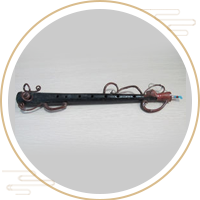Leyou overview
 Leyou (pinyin: lè yóu) is a folk double-reed vertical joy instrument of the Buyi people. Shaped like a suona, without a bowl, it is played with a worm whistle, which can be played solo or as an accompaniment to singing. It is popular in the vast area of southwestern Guizhou.
Leyou (pinyin: lè yóu) is a folk double-reed vertical joy instrument of the Buyi people. Shaped like a suona, without a bowl, it is played with a worm whistle, which can be played solo or as an accompaniment to singing. It is popular in the vast area of southwestern Guizhou.According to the "Brief History of the Buyi Nationality": "During the Qianlong period of the Qing Dynasty (AD 1739-1795), the Yangba of Hengzhou Tong was recorded, and the courtship of Pu'an Prefecture (now Xingyi) began to compile and perform Buyi operas." Leyou was the earliest It is used in Bouyei dramas, where it can best express the complex inner emotions and dashing and romantic characters of Danjiao and Xiaosheng. It can be seen that Leyou has been born for a long time. It has a history of more than 300 years.
Leyou was originally called "Leyou". Because this musical instrument is played like a suona, and cicadas are used as worm whistles, it makes the singing sound of cicadas and insects. Therefore, everyone calls it "Leyou". Later, it gradually became a medium for the later generations of the Bouyei people to talk about love, so it is also called "Leyou" or "Leyou" (Leyou: Buyi language, that is, to invite friends). Leyou has deeply rooted in the life of the people of Buyi and has been passed down from generation to generation. Leyou is a folk double-reed vertical joy instrument of the Buyi nationality. It is shaped like a suona, without a bowl, and is played by a worm whistle, which can be played solo or as accompaniment to singing.
Leyou is usually played alone, but also in ensemble forms with suona, xiao and other instruments. Leyou tune is a kind of song named after Leyou as an accompaniment, which is relatively rare in the folk songs of other ethnic groups. Leyou tune is relatively free in terms of sentence patterns and singing. Its lyrics are relatively concise, and the lining words in the lyrics are an imitation of the sound made by the musical instrument "Leyou".
- Chinese name:Leyou
- popular area:Southwest Guizhou vast area
- constitute:Buzzer, rod, heart core, brass hoop, insect whistle
- Pinyin:lè yóu
overview of other similar instruments
- sanyanxiao overview
- Daguangxian overview
- Leiqin overview
- hahao overview
- yandundagu overview
- Han Xiaozheng overview
- Fang Xiang overview
- guanzi overview
- zhuqin (Dao Qin) overview
- zhuiqin overview
- bangzi overview
- three-stringed piano overview
- Gehu overview
- xiao overview
- xiaokonghou overview
- Konghou overview
- Sheng overview
- suona overview
- hulusi overview
- gushao overview
 渝公网安备 50010702504639号
渝公网安备 50010702504639号